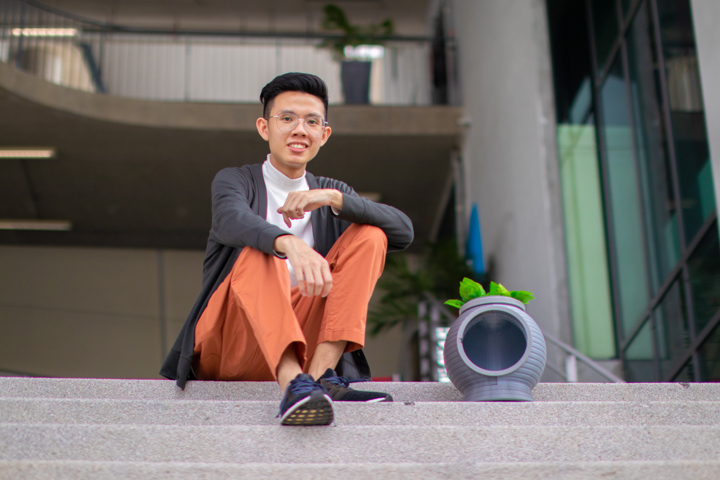The problem
Many developing countries still lack basic access to electricity. While access to electricity has been growing amongst the global population in the last three decades, an estimated 1.2 billion, or 16% of the world’s population still live without it. As a result, these communities face basic challenges such as refrigeration, which is known to be the most effective method of food preservation today.
The Invention
In a bid to address this problem, the winner of this year’s Malaysia National James Dyson Award Winner decided to engineer a cooler fridge that runs on zero electrical power.
KUNO, invented by Kuan Weiking and Theodore Garvindeo Seah from the Asia Pacific Institute of Information Technology, is a sustainable and eco-friendly alternative to conventional refrigeration. It is designed to prolong the shelf life of consumables and perishables in hot and dry climates. The team drew inspiration from Labu Sayong, a traditional water pitcher moulded from earth clay that can keep water cool naturally and effectively.
KUNO is made of a porous outer earth clay wall and adopts the use of evaporative cooling techniques; the evaporation of water draws heat away from the inner chamber, and releases it through the porous clay. This natural phenomenon brings the temperature of the chamber down, cooling the food and keeping it fresh for an extended period.
Looking ahead, the team aims to collaborate with the local cottage clay industry to manufacture KUNO, and in the process support the industry’s efforts to diversify beyond the production of small souvenir items. They are also working towards partnering with pottery makers to launch KUNO commercially in selected regions.
Kuan Weiking, inventor of KUNO, said: “As a product designer, it is important that we look to design solutions that tackle societal challenges or problems - solutions that are both practical and widely accessible. We are grateful to have been given this opportunity to showcase our invention and share our mission to make a positive impact to the environment and local communities.”
Azlan Othman, Head of Design at PROTON, and a member of the JDA judging panel said: “The entries for Malaysia this year are all creatively packaged and well thought-out, both in terms of application and problem solving. I believe that we need to provide more motivation and exposure for young Malaysian inventors. I’m also excited to see more innovative and creative local inventions – ones that are not only practical, functional, but also effectively communicated in a way that would attract the attention of global investors.”
The Runners Up
Pebble
The problem: It is estimated that one-third, or 1.3 billion tonnes, of global food produced annually for human consumption is lost or wasted. In Malaysia alone, food waste amounts to 15,000 tons daily; this includes 3,000 tons of food that is still good for consumption – food that should not have to be discarded. Often, food wastage occurs in homes due to the lack of tools to monitor the shelf life of food properly and accurately.
The solution: Pebble, invented by Chuah Ee Hua from Universiti Sains Malaysia, is an automated food tracking system aimed at reducing household food waste. With its in-built scanner, Pebble serves as a platform to automatically retrieve purchase data using existing Application Programming Interfaces (APIs). Through push notifications from its mobile application that is synced with the scanner, users can keep track of food expiry dates effortlessly. With the APIS, recipes are generated automatically based on food items that are close to expiry. This helps users to plan their meals efficiently, and prevent the needless disposal of forgotten food items that are past expiry.
Vibraille
The problem: Globally, it is estimated that at least 2.2 billion people suffer from some form of visual impairment or blindness. For many of these people, the ability to read texts and digital materials independently over their mobile devices can be a challenge.
Solution: Vibraille enables blind communities to read digital materials using phones by sensing the vibration. It translates information into Braille, unlike mainstream approaches that use external devices or voice readers. This haptic approach to reading on a mobile device also means that Vibraille users can maintain their personal privacy.
KUNO, Pebble and Vibraille will progress to the international stage of the James Dyson Award, and international prizes will be announced on 19th November 2020.



Share this page on